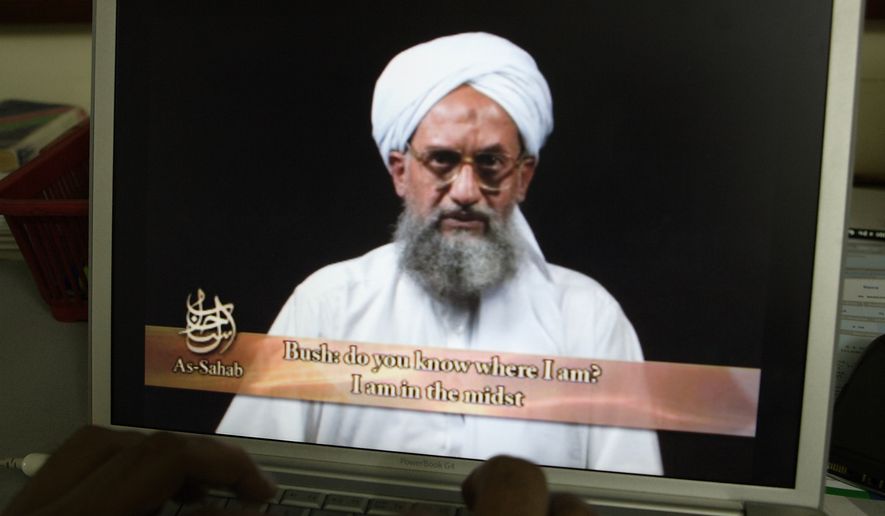The U.S. killed al Qaeda leader Ayman al-Zawahri, who helped plan the Sept. 11, 2001, terrorist attacks, in a drone strike in Afghanistan over the weekend, President Biden announced Monday night.
“Now justice has been delivered and this terrorist leader is no more,” Mr. Biden said in a televised address from the White House. “People around the world no longer need to fear the vicious and determined killer.”
He called the mission “a total success.”
The missile strike occurred Saturday night in Kabul, where al-Zawahri was standing on a balcony at an al Qaeda safehouse, a senior administration official said.
Mr. Biden said U.S. intelligence officials learned earlier this year that al-Zawahri had moved into the safehouse with family members. The president said he authorized the strike one week ago.
“He carved a trail of murder and violence against American citizens, American service members, American diplomats and American interests,” said the president, who is isolated after testing positive for COVID-19 for a second time.
SEE ALSO: Hitting back: Ukraine’s forces poised to take offensive in south against Russia
Al-Zawahri, an Egyptian who took over al Qaeda after the U.S. killed its longtime leader Osama bin Laden in 2011, had been a top U.S. target.
Speaking of the Sept. 11 terrorist attacks, Mr. Biden said he hoped that al-Zawahri’s death will bring “one more measure of closure” to survivors and victims’ relatives.
Mr. Biden ordered the strike following a series of meetings with key advisers and Cabinet members, the administration official said. One meeting included a scale model of the safe house in Kabul.
The president referred to bin Laden’s plotting of the 9/11 attacks from Afghanistan under the Taliban’s protection more than a decade ago. He said the country “can’t be a launching pad against the United States.”
No other individuals, including civilians and members of al-Zawahri’s family, were killed during the operation, which was carried out by the CIA using two Hellfire missiles, the official said.
The official credited “careful, patient and persistent” work by U.S. counterterrorism professionals for locating and killing al-Zawahri. There were no U.S. troops in Kabul during the strike, according to the official.
The State Department had offered a reward of up to $25 million for information leading to his capture.
His death is a major victory for the U.S., as it struggles to control the reemergence of the terrorist groups after the chaotic withdrawal of Afghanistan last year, ending the longest U.S. war.
Sen. Jack Reed, Rhode Island Democrat and chairman of the Senate Armed Services Committee, called the operation “welcome news.”
“This strike is a significant blow to al Qaeda and demonstrates the United States’ enduring commitment to hunt down terrorists, degrade their capabilities, and bring the perpetrators of 9/11 to justice,” Mr. Reed said.
The senior official said the Taliban was aware of the al Qaeda leader’s presence in Kabul, but did not comment on whether others such as Pakistan were aware of al-Zawahri’s location.
A Taliban spokesperson condemned the U.S. operation, saying the strike was conducted at a residential house in a wealthy downtown neighborhood in Kabul. The Taliban official said they believed the Doha agreement, which outlined the terms of the U.S.’s withdrawal from Afghanistan, barred American drone strikes.
The White House said the Taliban’s harboring of al-Zawahri was also a violation of the Doha agreement, thus justifying their action.
“We will take actions to protect our interests,” the official said.
Sen. Ted Cruz, Texas Republican, hailed the reports of al-Zawahri’s death.
“This is an important accomplishment. All Americans will breathe easier today knowing Ayman al-Zawahri, the leader of al-Qaeda, has been eliminated,” Mr. Cruz said in a statement. “This strike should be a message to terrorists near and far: if you conspire to kill Americans, we will find and kill you.”
Although he did not receive the merit the recognition of his predecessor, al-Zawahri, 71, was a highly visible symbol of the terrorist organization. He helped to mastermind the Sept. 11, 2001, terrorist attacks as well as the 1998 suicide bombings of U.S. embassies in Kenya and Tanzania that killed more than 200 people.
Other al Qaeda operations in which al-Zawahri played a role, included the attack on the USS Cole in Yemen in October 2000, in which suicide bombers killed 17 American sailors.
Al-Zawahri would also send out videotaped and other messages urging Islamic militants to continue battling the U.S. and taunting American presidents.
“Those 19 brothers who went out and gave their souls to Allah almighty, God almighty has granted them this victory we are enjoying now,” he said in an April 2002 video message hailing the largest terror attack on U.S. soil.
He moved around constantly after the U.S. invaded Afghanistan following the Sept. 11 attacks. In 2008, he narrowly escaped a U.S. drone attack that killed his wife and children.
After taking over al Qaeda in 2011, al-Zawahri shifted how the terrorist group operated. He moved it from an organization that planned and carried out attacks to a network of autonomous groups in Iraq, Saudi Arabia, North Africa, Somalia, Yemen and Asia that instigated their own operations.
Al Qaeda has largely receded from the headlines in recent months, but a U.N. report found that the terrorist organization, along with the Islamic State, is growing in strength and could pose a threat to the outside world.
The report found that al Qaeda’s threat remained high in conflict-rich regions like Afghanistan and its neighboring countries, though the U.N. also warned that the terror group could strike in a non-conflict area as well.
Al Qaeda has been enjoying limited interference from Afghanistan’s Taliban regime, and some of its senior officials are providing advisory services to the country’s de facto government, the report said.
Correction: A previous version of this article incorrectly reported the year of the Sept. 11, 2001, terrorist attacks.
• Jeff Mordock can be reached at jmordock@washingtontimes.com.




Please read our comment policy before commenting.